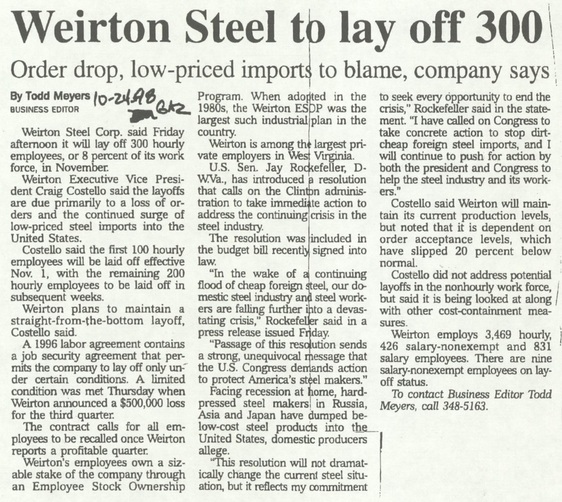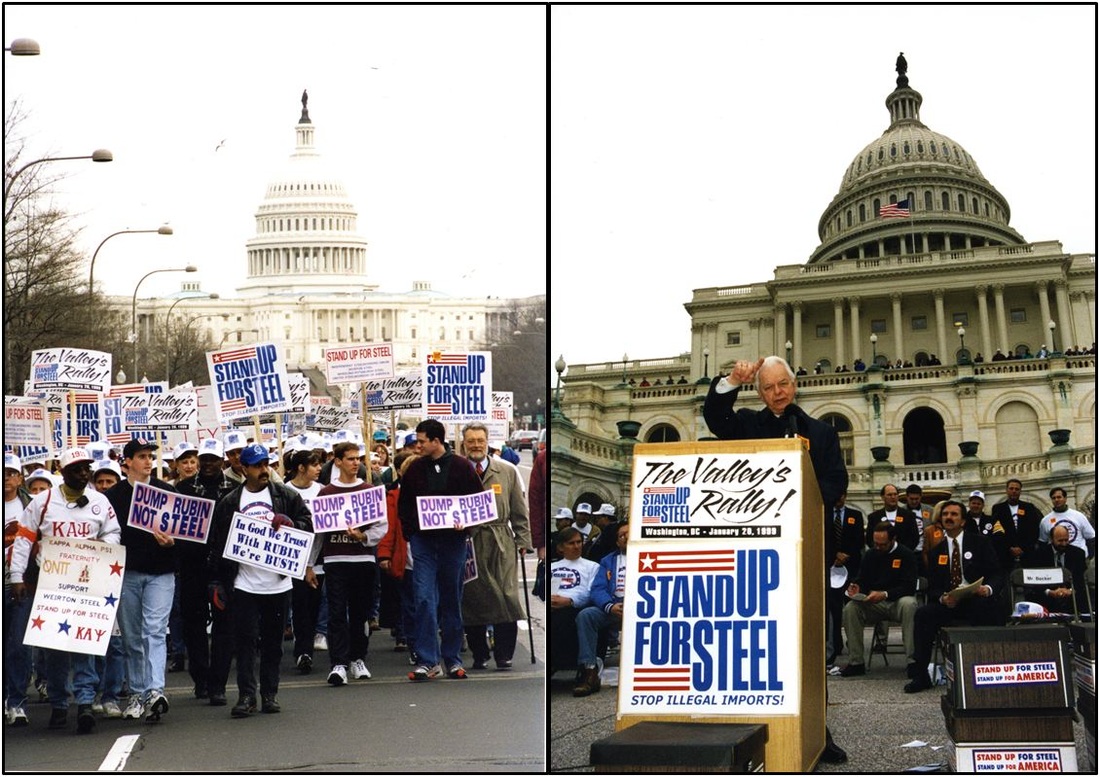|
By Jody Brumage In West Virginia, Senator Byrd is widely remembered for his support of coal, the industry and the miners as a driving force in the state’s economy. However, Senator Byrd also supported the steel industry, both within and outside West Virginia. In the late 1990s, the Senator pushed for the passage of the Steel Loan Guarantee Program which provided much needed economic assistance to the struggling industry. The steel industry in West Virginia is centered in its northern panhandle, especially in the city of Weirton. Beginning in the early twentieth century, steel production in Weirton provided massive economic benefit to the region and employed thousands of workers. By the 1990s, Weirton Steel along with the entire U.S. steel industry was in decline and hundreds of workers were being laid off. One of the reasons cited for this decline was the flood of foreign imported steel at cheap prices, forcing the downsizing of domestic steel production. In early 1998, Senator Byrd proposed an amendment to a bill providing funds for the International Monetary Fund which had been depleted in the effort to stabilize an economic downturn in Asian markets. The amendment would prohibit funds from being allocated to foreign steel imports, especially those from South Korea’s state-subsidized steel industry. However, while this measure was designed to lessen the impact of the cheap foreign steel that was being dumped in the U.S., Senator Byrd developed a plan that would provide more direct assistance to the ailing domestic steel industry. Along with representatives of Weirton Steel, Senators Byrd and Jay Rockefeller met with Vice President Al Gore in December, 1998 to urge the president to support emergency funding. In a letter to the vice president, Senator Byrd stated “I urge you in the strongest terms, to give urgent consideration to the inclusion in your Fiscal Year 2000 budget of an appropriate emergency relief package for the U.S. steel industry.” A few weeks later, on January 20, 1999, Senator Byrd addressed a crowd, gathered for the “Stand Up for Steel” Rally, declaring that “foreign companies are dumping steel in America below cost. Those foreign companies are hurting American families and destroying American jobs. This must end now.” On March 4, 1999, Senator Byrd proposed the “Emergency Steel Loan Guarantee Program Act,” designed to create a board, headed by the secretary of commerce, to authorize up to $1 billion in loans to shore-up U.S. steel manufacturers. Over the next few weeks, Senator Byrd worked to gain bi-partisan support for the measure, receiving support from West Virginia Congressman Alan Mollohan and Pennsylvania Congressman John Murtha. As the conference committee continued to debate the emergency supplemental bill, Senator Byrd’s loan program, as well as a similar act for the oil and gas industry, proposed by New Mexico Senator Pete Domenici, became the main road blocks to the bill’s passage. A midnight vote on May 12, 1999 was affirmative for Senator Byrd’s Amendment, but not for Senator Domenici’s program. However, the victory was short-lived, as the two republicans who had supported the amendment switched their votes after a meeting with Speaker of the House Dennis Hastert.
After the disappointing turn of events, Senator Byrd turned to the leadership of the House and Senate and secured their commitments to shift his steel loan program, as well as Senator Domenici’s oil and gas loan program into another bill. House Resolution 1664 became the “Emergency Steel Loan Guarantee and Emergency Oil and Gas Guarantee Loan Act of 1999,” which passed the Senate on June 18, 1999 and the House on August 4, 1999. A day later, Senator Byrd wrote to President Bill Clinton, urging his quick signature on the bill. On August 18, 1999, President Clinton signed the act into law. In the aftermath of his battle for the loan program, Senator Byrd aided Weirton Steel in securing a loan of $25 million. Despite the immediate aid provided by the loan program, the steel industry in the U.S. has continued to decline. Weirton Steel declared bankruptcy in 2003 and has since been bought out by several companies who have downsized the mill. However, Senator Byrd’s role in staving off the immediate collapse of the steel industry is still recognized today by many. Comments are closed.
|
Welcome to the Byrd Center Blog! We share content here including research from our archival collections, articles from our director, and information on upcoming events.
Categories
All
Archives
July 2023
|
Our Mission: |
The Byrd Center advances representative democracy by promoting a better understanding of the United States Congress and the Constitution through programs and research that engage citizens.
|
Copyright © Robert C. Byrd Center for Congressional History and Education
|



 RSS Feed
RSS Feed
